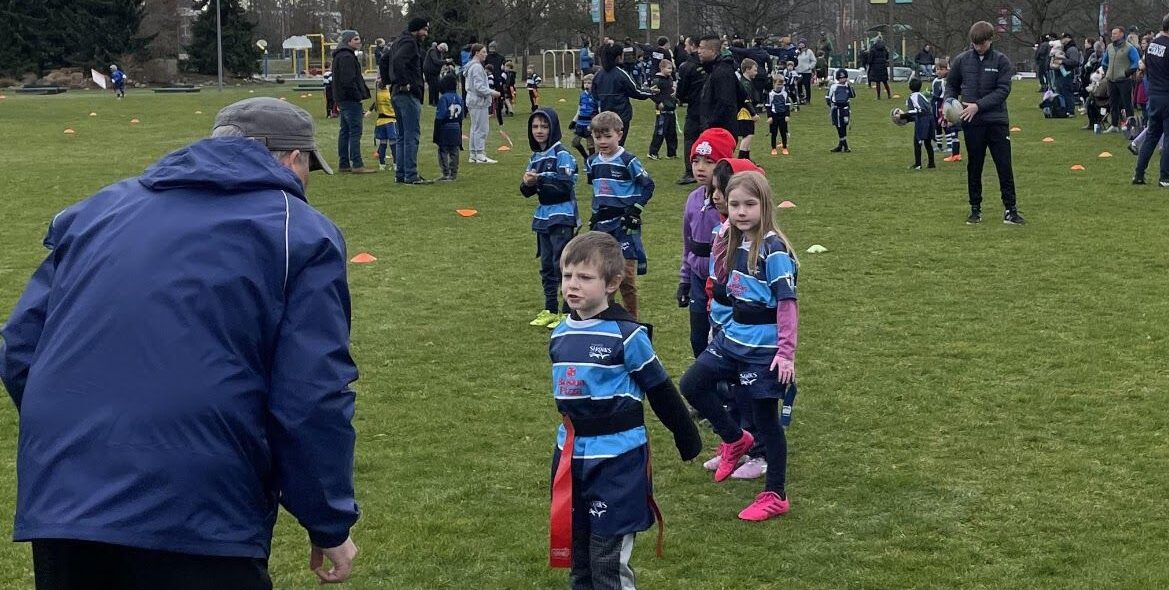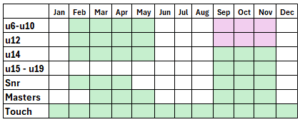New to rugby
Starting rugby as a newcomer can be both exciting and challenging, but it’s an amazing way for young kids to develop important life skills. The sport encourages physical activity, helping children build strength, coordination, and endurance while keeping them active and healthy. Beyond the physical benefits, rugby teaches kids the value of teamwork, as they work together to achieve a common goal. The fast-paced, high-energy nature of the game requires trust and communication, fostering a sense of camaraderie among teammates. Rugby also creates a supportive community where kids can build friendships, develop confidence, and learn the importance of discipline, respect, and perseverance—values that will serve them both on and off the field.

FAQ: Why Should I Sign My Kid Up to Play Rugby?
Rugby provides a full-body workout that helps kids improve strength, endurance, and coordination. It's a great way for children to stay active, while also promoting teamwork, discipline, and respect for others. The game also helps develop important motor skills, agility, and mental toughness.
Yes, when played in a controlled, coached environment with proper safety protocols in place, rugby is safe. the BCRU youth rugby leagues emphasize tackling safety and encourage non-contact versions of the game for younger children.
- U6, U8 and U10 all play flag rugby.
- U12 in an introduction to contact
- Older players that join Bayside can only play contact once coaches are confident they have the necessary technique and strength to make tackles.
Rugby teaches players how to fall safely and how to avoid injuries through good technique.
Rugby instills values like teamwork, leadership, and respect. Kids learn how to work together to achieve a common goal, how to respect referees and opponents, and how to overcome challenges on and off the field. The sport also encourages sportsmanship and resilience.
Rugby helps develop both physical and mental skills. Your child will learn hand-eye coordination, footwork, tackling techniques, strategic thinking, and the importance of fitness. Mentally, rugby teaches kids how to stay focused, make quick decisions, and manage both success and setbacks.
Absolutely! The athletic skills learned in rugby — including speed, agility, strength, and hand-eye coordination — translate well into other sports like soccer, basketball, and football. Rugby also teaches spatial awareness, teamwork, and communication skills that can be applied to other team-based activities.
Yes, rugby is a highly social sport. Children have the opportunity to meet new friends, form strong bonds with teammates, and interact with kids from different backgrounds. The team atmosphere fosters camaraderie, and rugby clubs often have tight-knit communities that extend beyond the field.
Rugby is a game of constant challenge, and kids get a great sense of accomplishment as they improve and develop their skills. It helps kids build mental toughness, encourages them to push their limits, and rewards effort. As they see themselves progress, their confidence grows both on and off the field.
Rugby schedules vary depending on age and level, but u12 and up have two practices and a game on weekends. (u6-u10 have 1 practice and 1 game on weekends)
- u6-u12 see schedule Mini can sign up for Spring, Fall or both seasons
- u13-u19 see schedule
- u13-u19 girls
Rugby can be intense, but coaches are trained to ensure that kids are matched with appropriate levels of competition. For younger children, non-contact versions of the game like flag rugby are often introduced, focusing on skill development and fun. As they grow, the intensity increases, but safety and enjoyment remain top priorities.
No problem! Rugby is a sport that welcomes beginners. Coaches are there to teach the basics, and rugby is a game that emphasizes learning and growth. It’s all about enjoying the game and developing at your own pace. Many clubs have entry-level teams where kids can get started no matter their skill level.
- Rugby boots: Soccer or football cleats will do till u14
- Mouth guard: gumshields are proven to prevent concussion, not needed in u6 - u10 (but a good habit to get into when younger as it helps with breathing and communication)
- Shorts & Socks: These will be provided at Bayside as part of your Fees
- Rugby Training Top: shirt or top made from tough, tear-resistant material
- U12 and older players typically participate in games that last between 60 to 80 minutes, depending on their age group.
- Meanwhile, U6 to U10 players engage in jamborees, primarily held at Bayside, which focus on fun and development. At this stage, results and competition are secondary, with the emphasis being on enjoyment and building skills.
Yes, you can, come out at any time and introduce yourself to the coaches and have a practice with us. We are not here to make money, we are here to introduce kids to this amazing sport.
